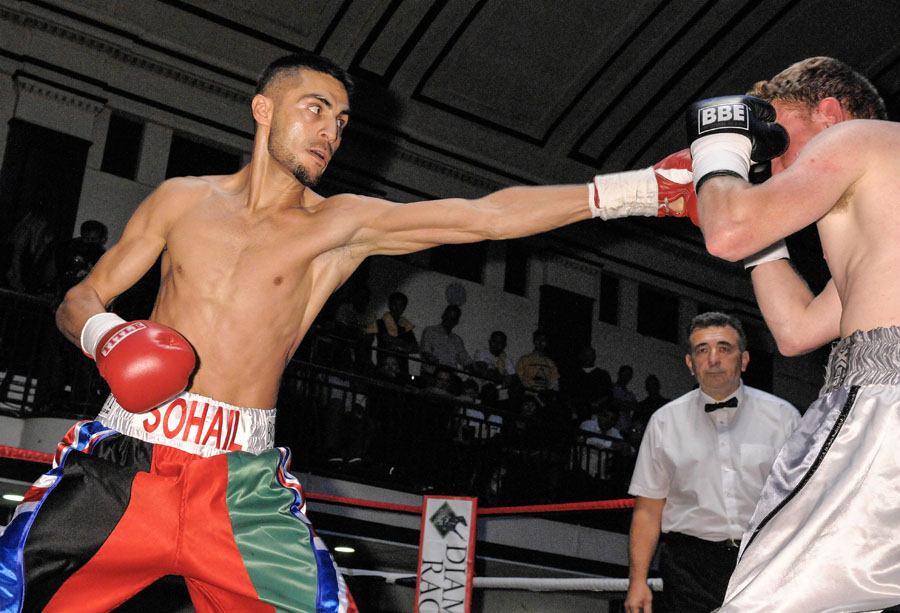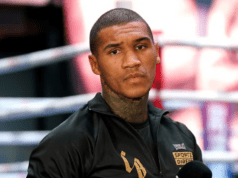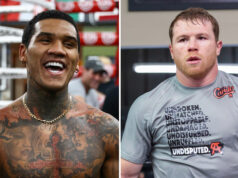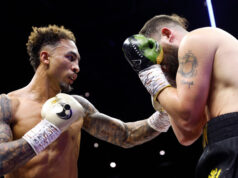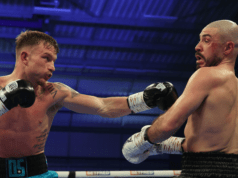Sohail Ahmad is an unbeaten prospect based in the UK, with a 4-0 record thus far in his young career. More than that though, he’s from Afghanistan, and is one of the few Afghan professional boxers competing anywhere in the world.
Recently, we caught up to Ahmad to learn more about him and his background, boxing in Afghanistan, and his goals.
Could you tell us about your back story?
I was born in Afghanistan, I came (to the UK) when I was about 11 years old. I settled down here and went to school, college, university. I came alone but then I settled down with my aunt’s family for a few years until I was 13 or 14, when I went into social services care. My aunt had her own family and she just needed some space and time. It was alright, it is what it is. I didn’t care where I lived anyway because I was quite disciplined. I went to school, I went to training, it didn’t really bother me where I lived. It wasn’t easy but I tried to make the most of it.
What is boxing like in Afghanistan?
It’s getting a bit more popular now. The sporting infrastructure is not good. Everything is corrupt these days, you know what I mean? Even the sports department, the Olympic committee. Now it’s changing a little but before everyone just put money in their own pockets.
There aren’t many Afghan boxers in the world. Is this a good or bad thing for you personally?
To be honest I’m not really thinking like that. I’m just doing what I want to do and trying to achieve my own goals. It doesn’t really affect me in any way. If anything it does put a little bit of pressure on (me). Obviously if you are Afghan, and you do well in what you do, you will be known back there, like Prince Naseem Hamed was in Yemen. It has its ups and downs.
What got you interested in boxing?
When you come from a foreign country and no-one knows who you are, you (enter) this new environment…I just wanted to better my life. I’m quite sharp as well, I have my degree in Sports Science, but I just loved boxing and wanted to achieve something through it. I loved sport in general.
What was your amateur background like?
It was okay, I didn’t have a lot of fights. I had a few fights for Repton and Dale youth. From 12 (years old) until 17 I did Taekwondo, (in which) I got a black belt, I was British junior champion and I won a bronze medal in the open European championships in 2005. The reason I picked up that was I used to get bullied in school so I just needed to know how to fight. I used to be the odd one out in the class so Taekwondo helped.
Why did you switch from Taekwondo to boxing?
Taekwondo is a sport where you have to follow a lot of old, ancient rules. You just stick to them and can’t really express yourself as a fighter, everyone is the same. I don’t like too many rules in what I do, I like to fight how I wanna fight and have my own style. In Taekwondo you have to stick to the traditional rules. Boxing gives me a bit more freedom for expression.
Given that freedom for expression how would you describe your style as a fighter, and also as a person?
I’m very tall for my weight class. At the moment I’ve had four fights, so I’m just looking to find my own style. I look at different fighters and I pick up things from each one of them. As a person, I don’t really talk a lot, I like to stay humble and keep working hard.
How did your nickname; “Showstar” come about?
No matter where I go, with family or friends, I always stand out. When I’m on a night out everyone always notices that I’m there, I dress quite slick!
Whose gym do you train out of?
My trainer is Rod Julian at RJ’s gym in Chingford. I’ve been there for three fights now and he’s doing a good job with me. He’s very close to me (which) helps a lot. Michael Lomax is there, he’s an experienced fighter. For my first pro fight I sparred with Stephen Smith which was good experience for me, but at that time I was with a trainer who was trying to change me as a fighter, make me something I wasn’t. I wasn’t comfortable trying to manipulate his training method into sparring. It didn’t work for me, so I had to switch trainers. If I sparred Stephen Smith now it would be more beneficial.
What is the hardest element of being a professional fighter, in your opinion?
Selling tickets. My promoter doesn’t have a television deal and trying to sell tickets to raise money before a fight is the hardest part. If you don’t sell (enough) tickets you won’t be able to fight, so that’s the most stressful thing.
In your 3rd fight, with Ivans Levickis, you suffered a knockdown. Describe that experience.
I won the first three rounds clean. In the last round I just got caught with a shot that I didn’t see coming. I got put down but I was okay, I even finished that round strong. Its just one of those things in boxing; if you’re not careful and you lose concentration for a split second you can get caught. It (taught) me to stay focused for the whole fight. In terms of the quality of opponent, that fight was the toughest that I’ve had.
You earned your first stoppage win last time out. Is your power improving?
In training I’m (learning) to be more settled and place my shots rather than just running around.
Next up you fight Kristian Dochev, are you preparing any differently for him?
Training is going really well, I’ve been sparring with Mitchell Smith. I’m just (carrying on) from my last fight basically. Finding my range, using my reach, not getting involved in a fight, using my boxing. (I will) be smart and if the knockout comes, it comes.
Finally, what are your career ambitions?
You know what, no-one ever thought that a kid from Afghanistan would come to London and achieve what I’ve achieved. I’ve always been hungry for recognition, so my ambition is just to get to the top.


